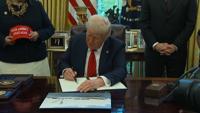WASHINGTON, Md. - A new executive order from President Donald Trump aims to revitalize the U.S. seafood industry by reducing regulatory burdens and limiting illegal imports.
According to the order, titled Restoring American Seafood Competitiveness, nearly 90 percent of seafood on U.S. shelves is currently imported. The directive seeks to change that by expanding domestic production and making the industry more globally competitive.
"We've been held down, I mean, everybody — you name a fishery that hasn't. My commercial fishery for striped bass, over the past 8 or 10 years has had a 40% reduction in what we can catch," said Rob Newberry, a commercial waterman and president of the Delmarva Fisheries Association.
The order directs the Secretary of Commerce to identify the most overregulated fisheries within 30 days and take steps to ease those restrictions. In addition, the administration plans to crack down on low-cost, illegal seafood imports, particularly those from countries tied to overfishing or forced labor.
Bruce Cole, owner of Cole’s Seafood House and Deli, said he's witnessed the impact of imports firsthand — especially when it comes to crab meat.
"Well you can't compete, with local crab meat, with Venezuela because Venezuela is so cheap, when it cost so much to pick it here locally and crab meat is so high," Cole said.
Newberry also pointed to the importance of maintaining some level of regulation, but believes the new strategy will help U.S. producers compete.
"The imports will stop, the regulations will go up and we'll be able to catch more fish. There's going to be some people hollering abuse of the fishery. We're not going to catch the last fish. There will still be regulations in place. It's not just opening the floodgates," he said.
He added, "But with the tariffs and these reevaluation of these management practices, it's going to make the United States more competitive."
The executive order also requires the Secretary of Commerce to work with regional fishery councils and consider revising key regulations over the next 180 days, with the hope that more local seafood will be caught and bought.


